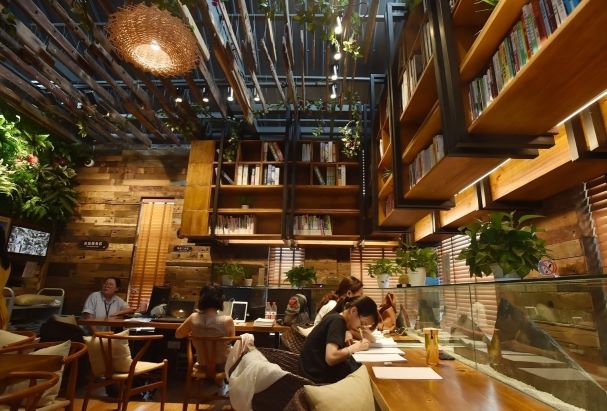Migrant worker’s farewell letter to library finds him new job
By He Linping, People’s Daily
Photo shows a corner of a 24-hour self-service public library in Yangzhou, east China’s Jiangsu province. The city has made all-out efforts to establish a reading service system featuring 24-hour service. At present, there are 29 such libraries, which have been specially designed to offer a pleasant reading atmosphere and comfortable reading areas for readers. (Photo by Zhuang Wenbin/People’s Daily Online)
Wu Guichun, a migrant worker in Dongguan, south China’s Guangdong province, didn’t expect that a farewell message he left in June for a library in the city in turn continued his bond with the city.
Wu, from central China’s Hubei province, came to Dongguan in 2003. As he only received elementary school education, he could only work as a choreman in factories.
Reading has been Wu’s only hobby through the years. He used to visit roadside bookstalls frequently to buy books in his spare time.
“Why don’t you go to the library since you love reading so much? You can read there for free, plus they have a massive collection of publications,” a coworker suggested to Wu one day in 2008. Wu didn’t believe what his coworker said until he got up the courage to visit the Dongguan Library, where he found it was easy and comfortable to read. “More importantly, it is free,” Wu said.
He spent most of his spare time in the library during holidays or on the days off since 2008. “I ate more in the morning if I planned to go to the library, so that I wouldn’t feel hungry the whole day and could stay in the library till it closed,” Wu said.
Because the COVID-19 pandemic has taken a heavy toll on many industries in the city, Wu decided to leave Dongguan for his hometown to find a new job.
When he went to the Dongguan Library to return his library card on June 24, Wu wrote on a comments book of the library “…Looking back on my life in Dongguan over the years, I find the library is the best place I’ve been to. As much as I hate to leave, I have to make a living. Never will I forget you in the rest of my life…”
The message aroused wide attention online the next day. The heart-touching words conveying simple and honest sentiments of the migrant worker to the library moved numerous people.
While many netizens felt sorry that the bookworm had to leave the place he likes so much, the official account of the library on micro-blogging site Sina Weibo forwarded relevant news and commented, “We will always be here, looking forward to seeing you again.”
Fortunately, the news drew the attention of the city’s employer-employee match-making service center, which promptly searched for suitable jobs for Wu and received responses from many enterprises.
On June 26, Wu passed the interview of a property management company and got a new job. On the afternoon of the same day, he resumed his library card of the Dongguan Library.
“I feel great as I can stay and read here again,” Wu said.
Wu is a witness to the ever-growing reading atmosphere of Dongguan, a city planning to build itself into a city of libraries since 2004.
By the end of last year, the city had built a main public library and 52 branch libraries. These public libraries were visited over 13.53 million person-times last year, or an average of 37,000 readers per day.
There are much more readers today in Dongguan Library, and some even sit on the floor during weekends and public holidays, according to Wu, who said the situation stands in stark contrast with that more than ten years ago when he first started to read in the place.
The atmosphere of reading adds to the charm of Dongguan. As books nourish the mind, they make people who read them sparkle. While playing their parts in city construction, migrant workers are also eager to absorb spiritual nourishment in public libraries of the city.
As the public cultural service systems improve, migrant workers’ demand for reading has been gradually met. China is looking forward to seeing more readers like Wu who contribute to and benefit from urban development.













